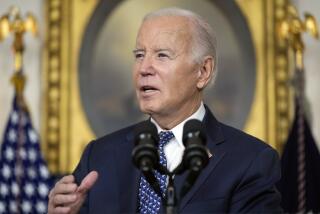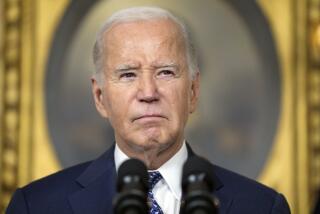Doctor Testifies Deaver Had Impaired Memory
WASHINGTON â A doctor who treated Michael K. Deaver for alcoholism testified Friday that the former presidential aide suffered memory impairment when he took tranquilizers during hospital treatment for the disease.
âHe wasnât really processing or dealing with things in an appropriate manner,â Dr. William E. Flynn said of Deaver when he took heavy doses of the tranquilizer Valium during alcohol withdrawal in 1985.
Flynn, head of the alcoholism clinic at Georgetown University Hospital, testified at a court hearing on Deaverâs medical condition.
But on cross-examination, Flynn admitted that he never tested Deaverâs memory during the three-day hospital stay and meant to say earlier that âpeople in that situation have impaired memory and judgment.â
âIt is not my testimony that I did tests on him and determined impaired memory on his part,â Flynn told independent counsel Whitney North Seymour Jr.
Alcoholism Expert
An alcoholism expert called by the prosecution, meanwhile, testified that his review of Deaverâs medical records showed the former presidential aide did not suffer any memory loss.
Defense lawyers are trying to convince U.S. District Judge Thomas Penfield Jackson that Deaverâs alcoholism is a factor that should be taken into consideration when he is sentenced next Friday for three perjury convictions.
The former White House deputy chief of staff was convicted last December of three counts of lying to a federal grand jury and a House subcommittee by saying he could not recall contacting government officials on behalf of high-paying lobbying clients.
The defense contends Deaver was not lying in 1986 when he testified that he could not recall telephoning then-Transportation Secretary Elizabeth Hanford Dole from his hospital bed on June 3, 1985, on behalf of Trans World Airlines.
The medical testimony was not offered during Deaverâs trial because the defense rested without calling any witnesses.
The presentation during a two-day hearing that began Thursday appeared to be partly an attempt to put Deaverâs defense on the record for an appellate court.
More to Read
Sign up for Essential California
The most important California stories and recommendations in your inbox every morning.
You may occasionally receive promotional content from the Los Angeles Times.










